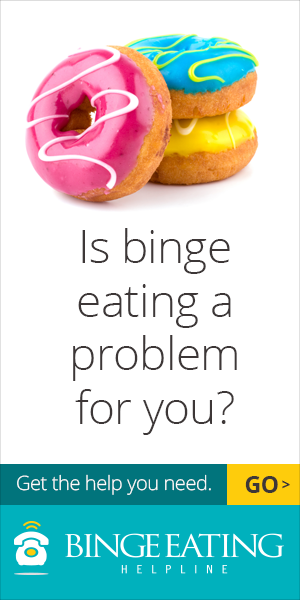The most important facts in a nutshell.
Eating disorders are curable, but the recovery process is lengthy and the risk of chronification is high. The best chances of recovery are when those affected seek help at an early stage. The therapy options range from outpatient psychotherapy, (day) clinics, self-help groups, self-help manuals to therapeutic residential groups. Which treatment is suitable depends on the symptoms and the situation of the patient.

Outpatient psychotherapy
The aims of psychotherapy are on the one hand to reduce the symptoms of eating disorders (e.g. normalisation of eating behaviour and weight) and on the other hand to treat the underlying or parallel psychological problems (e.g. self-esteem problems, social isolation, depression).
Psychotherapy is based on the illness phase and the individual possibilities of the patient and his life situation. Therapeutic work can help to reflect on situations and thoughts or to clarify one’s feelings. In the long run it can help to identify the causes and triggers of the eating disorder and to cope with the factors that sustain it.
Outpatient psychotherapy is particularly recommended in cases of bulimia and binge eating disorders, unless medical or social reasons make a previous inpatient stay necessary. Since anorexia often involves a high level of physical risk, in-patient therapy is often required first, followed by out-patient psychotherapy. Whether an outpatient therapy is sufficient should always be decided individually, in consultation with the doctor and/or psychotherapist.
The health insurance covers the costs of certain psychotherapeutic treatments. Details on cost absorption, therapist search, therapy application and duration can be found under Psychotherapy.
In-patient and out-patient treatment
A (partly) inpatient therapy should be carried out if the eating disorder is accompanied by a high physical risk, if an outpatient therapy is not sufficient or if the psychological condition or the social situation of the person concerned require it. Often several inpatient stays are necessary (so-called interval treatment).
Inpatient treatment
During inpatient therapy in a clinic, the patient is cared for by a multi-professional team consisting of psychotherapists, nurses, social pedagogues, nutritionists as well as physiotherapists and occupational therapists.
The inpatient treatment programme is often comprehensive and consists of individual and group therapy, movement, art or music therapy and (therapeutic) accompaniment during meals. Patients can also be monitored medically. The protected environment of a clinic, the support of the team of therapists and the fellow patients make it possible for many patients to face their fears and work intensively on their problems.
Partial inpatient treatment
After in-patient therapy, the transition from a clinic to everyday life is often very difficult and often leads to relapses. In this case, day-care therapy in a day clinic can be useful. In a day clinic, the affected person receives similar intensive support during the day as in a clinic, but returns to his or her familiar surroundings in the evening and on weekends. In this way he can gradually approach everyday life.
A partial inpatient therapy can also be completed without a previous stay at the clinic, e.g. if the patient does not want to be completely torn out of his usual environment. However, day clinics are not accessible from every place of residence, so that day-care treatment is not always possible.
Therapeutic living group
Adolescents and young adults have the opportunity to move into a therapeutic residential group, usually after in-patient treatment, if they are overwhelmed by their return to their familiar, usually problematic environment or if they do not receive sufficient support at home. Such a residential group can also be helpful for people with chronic eating disorders and pronounced social isolation.
In the living group, those affected can slowly take steps towards a healthy life and gain a foothold in everyday life in a supportive environment and in cooperation with a therapeutic team (consisting of psychotherapists, social pedagogues and nutritionists).
The offers range from 24-hour care with accompanied meals to freer models in which the affected persons only receive temporary help. Individual outpatient care is also possible. Here the patient lives in his own apartment and is visited at home by social pedagogues who support him in everyday life.
Medicamentous treatment
A purely medicinal treatment does not lead to recovery from eating disorders. In any case, psychotherapy is the treatment of first choice. Medications can accompany this.
In patients with bulimia, an antidepressant can be prescribed to accompany psychotherapy, because depression often occurs in connection with eating disorders. However, there are also proven positive effects on the symptoms of bulimia. Currently, only the active substance fluoxetine is approved in Germany for the treatment of bulimic patients over 18 years of age.
Doctors sometimes also prescribe low-dose neuroleptics in cases of a pronounced urge to exercise and compulsive thoughts in anorexic patients.
In any case, drug treatment should be discussed thoroughly with an expert psychiatrist, who can then adjust it individually.
Self-help
For many patients, the step to therapy is very big. The feeling of shame and the fear of opening up often prevent them from seeking professional help. Here, self-help can be a first step towards dealing with one’s problems. Also the exchange with other affected people can have a relieving effect and show new ways.

Self-help groups
Self-help groups are often offered by advice centres for eating disorders. There, those affected meet about once a week and exchange information on topics related to their illness. Usually a social pedagogue is present to lead the group. The exchange can help those affected to feel understood and to realise that they are not alone with their problem. Together, alternative coping strategies can be tested, the group can provide emotional support and the affected persons can benefit from the experiences and tips of other affected persons.
Virtual self-help groups
There are also self-help groups on the Internet. Self-help forums offer a platform for anonymous exchange with other patients.
But there are also dubious websites on which people with eating disorders do not exchange information with the aim of recovering, but in order to intensify their ill behaviour. Those affected should absolutely refrain from such sites!
Forums are recommended, which are cared for by moderators and which do not permit detailed data to weight, size and exact Essverhalten. This enables a meaningful, supportive exchange among people with eating disorders.
Self-help programs
Studies have shown that working with a self-help programme based on a specific manual and elements of cognitive behavioural therapy can be particularly helpful in patients with bulimia and binge eating disorder.
The following books offer scientifically founded manuals for guided self-help:
There are also self-help programmes on the Internet which are accompanied therapeutically (so-called guided self-help). The affected persons receive feedback from a professional helper at regular intervals. Such guided self-help for patients with bulimia can be found online.







